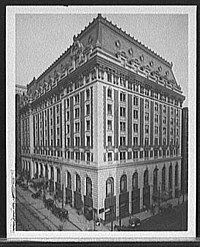David Sinton


David Sinton (26 June 1808 – 31 August 1900) was a pig-iron industrialist, born in County Armagh, Ireland, who became one of the wealthiest people in America.
Sinton was the son of linen manufacturer John Sinton, of Unshinagh, a Quaker (he was a cousin of Irish Quaker industrialist brothers Thomas Sinton and John Sinton), and Mary McDonnell. The family came to America, from Ireland, and settled at Pittsburgh when he was three years of age. Sinton had one brother (Dr. William Sinton, a physician) and two sisters (Isabella Eliza - never left Ireland and Sarah, married John Sparks - a banker).
A man of "irregular education",[1] his business interests centered on the manufacture of iron; the location of his furnaces was Lawrence County, Ohio.[2] Much of his fortune was made by stockpiling pig iron, waiting for the American Civil War and the selling that iron on at inflated prices.[1]

He was described as "a large, strong person with strong common sense, and therefore moves solely on the solid foundation of facts." His residence, at Cincinnati, was the old Longworth mansion on Pike street, built by Martin Baum early in the nineteenth century. Mr. Sinton's only surviving child, Annie, was the wife of Charles Phelps Taft, editor of the Times-Star[2] and brother of William Howard Taft; it was said that Sinton money financed the presidential bid.[1] He was the great-grandfather of First World War flying ace David Sinton Ingalls.[4]
Upon his death, age 93, he left $20,000,000 (the 2011 equivalent of this is c. $500,000,000) to his daughter, he was Ohio's richest man at the time.[5] His home is now the Taft Museum of Art. During his lifetime it was remarked that Sinton was philanthropic in his donations to the arts and the Presbyterian church, yet his own father's grave was not marked with a head-stone; "but David Sinton is wiser in his generation than they who seek to stab his character in such a paragraph [as erecting an ornate sepulcher]. He is one of God's noblemen."[6]
Sinton married Jane Ellison at Union Landing, Ohio. They had two children; Edward (1848-1869) and Anna Taft (1850-1931).
The town of Sinton, Texas is named in his honor (given that he was the majority stock holder in Coleman-Fulton Pasture Company,[7] as is the Sinton Hotel, a famous Cincinnati hotel.[8]
References
- ^ a b c Hess, Stephen, America's Political Dynasties, P. 306
- ^ a b Historical Collections of Ohio: Pages 843-847
- ^ Taft Museum of Art
- ^ Annie Sinton's obituary at Time
- ^ The New York Times
- ^ The Lawrence County Register
- ^ Relocate America; Sinton, Texas
- ^ Adams County, Ohio - notable people
